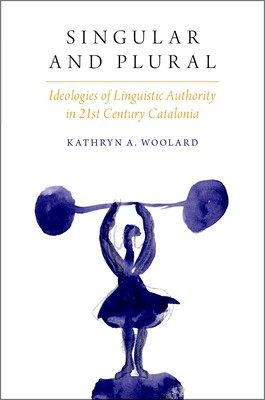
- We will send in 10–14 business days.
- Author: Kathryn A Woolard
- Publisher: Oxford University Press, USA
- ISBN-10: 0190258624
- ISBN-13: 9780190258627
- Format: 15.5 x 23.4 x 2.5 cm, softcover
- Language: English
- SAVE -10% with code: EXTRA
Reviews
Description
Winner of the Ramon Llull International PrizeWinner of the 2017 Society for Linguistic Anthropology Edward Sapir Book Prize A vibrant and surprisingly powerful civic and political movement for an independent Catalonia has brought renewed urgency to questions about what it means, personally and politically, to speak or not to speak Catalan and to claim Catalan identity. In this book, Kathryn Woolard develops a framework for analyzing ideologies of linguistic authority and uses it to illuminate the politics of language in Spain and Catalonia, where Catalan jostles with Castilian for legitimacy. Longitudinal research across decades of political autonomy contextualizes this ethnographic study of the social meaning of Catalan in the 21st century. Part I lays out the ideologies of linguistic authenticity, anonymity, and naturalism that typically underpin linguistic authority in the modern western world, and gives an overview of a shift in the ideological grounding of linguistic authority in contemporary Catalonia. Part II examines discourses in the media surrounding three public linguistic controversies: an
immigrant president's linguistic competence, a municipal festival, and an international book fair. Part III explores individuals' linguistic practices and views, drawing on classroom ethnographies and interviews with two generations of young people from the same high school. The book argues that there is an ongoing shift at both public and personal levels away from the ethnolinguistic authenticity that powered relations in the early transition to political autonomy, and toward new discourses of anonymity, rooted cosmopolitanism, and authenticity understood as a project rather than a matter of origins and essence. This shift is reflected in the current sovereignty movement.
EXTRA 10 % discount with code: EXTRA
The promotion ends in 17d.21:49:25
The discount code is valid when purchasing from 10 €. Discounts do not stack.
- Author: Kathryn A Woolard
- Publisher: Oxford University Press, USA
- ISBN-10: 0190258624
- ISBN-13: 9780190258627
- Format: 15.5 x 23.4 x 2.5 cm, softcover
- Language: English English
Winner of the 2017 Society for Linguistic Anthropology Edward Sapir Book Prize A vibrant and surprisingly powerful civic and political movement for an independent Catalonia has brought renewed urgency to questions about what it means, personally and politically, to speak or not to speak Catalan and to claim Catalan identity. In this book, Kathryn Woolard develops a framework for analyzing ideologies of linguistic authority and uses it to illuminate the politics of language in Spain and Catalonia, where Catalan jostles with Castilian for legitimacy. Longitudinal research across decades of political autonomy contextualizes this ethnographic study of the social meaning of Catalan in the 21st century. Part I lays out the ideologies of linguistic authenticity, anonymity, and naturalism that typically underpin linguistic authority in the modern western world, and gives an overview of a shift in the ideological grounding of linguistic authority in contemporary Catalonia. Part II examines discourses in the media surrounding three public linguistic controversies: an
immigrant president's linguistic competence, a municipal festival, and an international book fair. Part III explores individuals' linguistic practices and views, drawing on classroom ethnographies and interviews with two generations of young people from the same high school. The book argues that there is an ongoing shift at both public and personal levels away from the ethnolinguistic authenticity that powered relations in the early transition to political autonomy, and toward new discourses of anonymity, rooted cosmopolitanism, and authenticity understood as a project rather than a matter of origins and essence. This shift is reflected in the current sovereignty movement.


Reviews